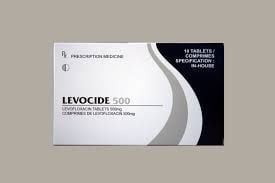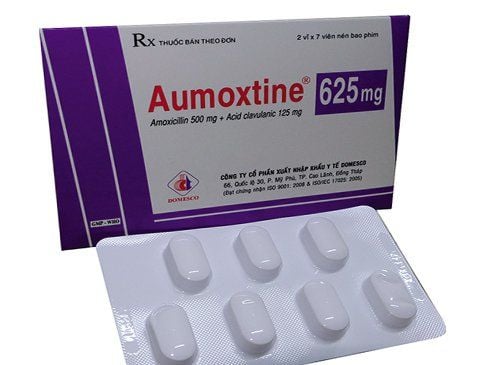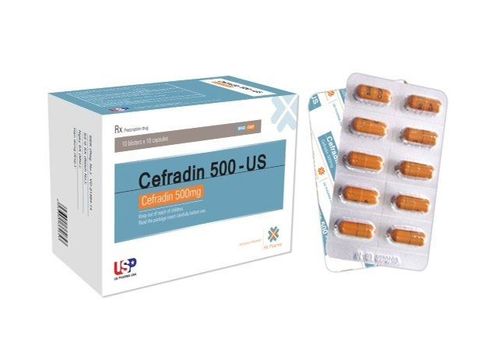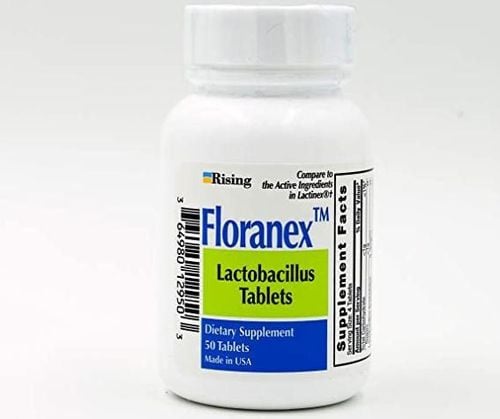This is an automatically translated article.
Vicimlastatin is mainly used to treat serious infections. For example, urinary tract or respiratory tract infections, etc. When starting treatment with Vicimlastatin, patients should strictly follow the instructions that the doctor has recommended.
1. What is Vicimlastatin?
Vicimlastatin drug is an antibacterial drug, often used to treat severe bacterial infections such as: lower respiratory tract infections, urinary tract infections, ... Vicimlastatin drug is made in the form of powder for injection, containing the main active ingredients are Imipenem (0.5g) and Cilastatin (0.5g) in the form of Cilastatin sodium. Vicimlastatin is packaged in boxes of 1 vial, 5 vial or 10 vials.
Active ingredient Imipenem: Is a broad-spectrum antibacterial agent with rapid bactericidal action due to its ability to interact with penicillin-binding proteins at the bacterial outer membrane. Therefore, this active substance can inhibit bacterial cell wall synthesis based on the same mechanism of action as other beta-lactam antibiotics. Active ingredient Cilastatin: Acts as an enzyme dehydropeptidase inhibitor in the renal tubules. The combination of Cilastatin and Imipenem can reduce the breakdown of Imipenem in the kidney, on the other hand helps to enhance drug recovery. The drug Vicimlastatin is very effective against most aerobic gram-positive bacteria and most anaerobic bacteria.
2. Indications and contraindications for the use of Vicimlastatin
2.1 Indications to use Vicimlastatin drug Vicimlastatin drug is often prescribed by doctors to treat severe infections below:
Urinary tract infections. Lower respiratory tract infections. Gynecological infections. Abdominal infection. Bile duct infection. Sepsis. Osteoarthritis infection. Soft tissue skin infections. Infections caused by many different strains of bacteria cannot be used with other potentially toxic drugs or other drugs with a narrower spectrum. 2.2 Contraindications to using Vicimlastatin drug Vicimlastatin drug is not indicated for use in the following subjects:
Patients with hypersensitivity or history of allergy to the active ingredients Imipenem, Cilastatin or other excipients contained in the drug. Contraindicated in patients receiving drugs containing sodium valproate due to the risk of decreased serum concentrations of sodium valproate. Relative contraindications to the drug Vicimlastatin for women during pregnancy or breastfeeding. Vicimlastatin is contraindicated in patients with severe liver and kidney failure.
3. Dosage and instructions for using Vicimlastatin
3.1 Dosage of Vicimlastatin Drug Dosage of Vicimlastatin drug will be determined based on the content of Imipenem active ingredient in the drug, specifically:
Adult dose:
Treatment of mild - moderate infections: Intravenous dose from 250 - 500mg every 6-8 hours / time. Treatment of serious life-threatening infections: 1g intravenous infusion every 6-8 hours. The maximum daily dose for patients with bacterial infections is 4g/day or 50mg/kg body weight. Dose for children < 12 years old:
The usual dose of Vicimlastatin is 15-25mg/kg body weight, intravenously every 6 hours. The maximum daily dose of Vicimlastatin should not exceed 2g. Intravenous dose of 4g/day for children with moderate P.aeruginosa infection. Intravenous dose of 90mg/kg body weight for older children with cystic fibrosis. Dosage for patients with renal impairment (determined based on creatinine clearance):
Clearance from 31 to 70ml/min: 500mg IV every 6-8 hours/day. Clearance 21-30ml/min: 500mg IV every 8-12 hours. Clearance from 6 to 20 ml/min: 250 mg IV every 12 hours. 3.2 Instructions for proper use of Vicimlastatin drug Vicimlastatin drug for the treatment of severe infections is indicated for intravenous administration. Before injection, about 250 - 500mg of the preparation will be diluted in 100ml of 0.9% NaCl solution. Avoid using distilled water for injection. Because the drug Vicimlastatin is not compatible with sodium lactate, this solution should not be used to dilute the drug.
4. Possible side effects when taking Vicimlastatin
Stop using Vicimlastatin and notify your doctor for appropriate treatment when the following side effects occur:
Shock with symptoms of poor digestion, bed-wetting, wheezing, dizziness, tinnitus , sweat stealing. Hypersensitivity reactions such as urticaria, rash, flushing, fever,... Anemia, leukopenia/granulocytosis, eosinophilia, purpura, agranulocytosis or leukemia. Increased ALT, Urobilinogen, ALP, AST, BUN, Bilirubin or y-GPT. Renal dysfunction such as interstitial nephritis, acute renal failure. Abdominal pain, pseudomembranous colitis, bloody stools. Abdominal pain, nausea, loss of appetite, diarrhea, vomiting. Confusion, convulsions. Colds, radiographic disturbances, dyspnea, interstitial pneumonia, PTE syndrome. Vitamin K, B deficiency with symptoms such as glossitis, neuritis, gastritis,... Gastritis or Candida infection. Lyell's syndrome. Headache, injection site pain, stiffness or thrombophlebitis.
5. Precautions when using Vicimlastatin
5.1 What should be noted when using Vicimlastatin? Here are some things that patients need to be careful about while taking Vicimlastatin:Adjust the dose according to the health status of elderly patients, especially those with problems with kidney function. Avoid mixing Vicimlastatin with other antibiotics. If it is necessary to take these drugs together, the doctor may inject them at different sites. Partial cross-reactivity of Vicimlastatin with other beta-lactam antibiotics may occur. Vicimlastatin should be used with caution in patients with a history of gastrointestinal disturbances, or with CNS symptoms such as convulsions, confusion or myoclonus. For pregnant women or nursing mothers, if necessary, consult a doctor. Vicimlastatin should be used with caution in children under 3 months of age. Prolonged use of Vicimlastatin may promote overgrowth of non-susceptible organisms. 5.2 Interactions of Vicimlastatin with other drugs Some reports indicate that Vicimlastatin drug may interact with the following other drugs:
Increases Vicimlastatin drug toxicity when used with probenecid and beta lactam antibiotics. Causes a decrease in the serum concentration of sodium valproate, leading to a stroke. Causes false positive test results when determining urinary glucose via Fehling, Benedict or Clinitest reagent. Causing a positive result on the Coombs test. In order to ensure safety and avoid drug interactions, patients should inform their doctor about any medications and health-promoting foods they are currently taking, as well as any other problems they have. The doctor will make recommendations to adjust and use the drug with the right amount for the patient.
Please dial HOTLINE for more information or register for an appointment HERE. Download MyVinmec app to make appointments faster and to manage your bookings easily.













